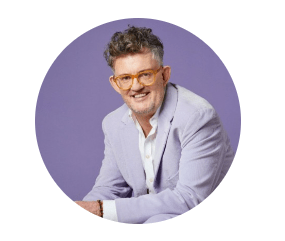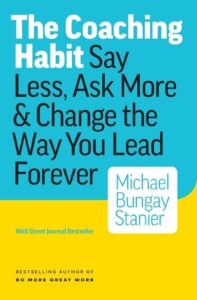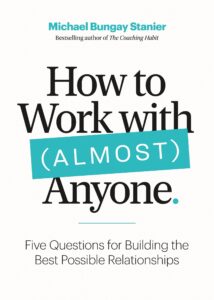I’m excited to share with you a conversation I had recently with leadership and coaching expert Michael Bungay Stanier.
Michael Bungay Stanier helps people be a force for change.

He’s best known for his book The Coaching Habit which has sold close to a million copies and has thousands of 5-star reviews online. His last book The Advice Trap focuses on what it takes to tame your Advice Monster. And his latest book, How to Work With (Almost) Anyone is hitting shelves right about now.
Michael was a Rhodes Scholar and plays the ukulele badly [his words, not mine!].
Hear all of what Michael had to say in episode 747 of the Modern Mentor podcast, hosted by me. Here are some of our key takeaways from the interview.
Michael’s most famous book, The Coaching Habit
So clearly we had to begin there! I asked him for the secret to great coaching. And he shared with me what he thinks of as his “bookend” questions—the opener and the closer that are designed to bring a coaching moment to life.

The opening question is “What’s on your mind?” He calls this one the “kickstart question.” And he loves this because “it says, ‘what are you worried about?’ Or ‘what are you anxious about?’ Or ‘what are you excited about?’ ‘Or what matters?’” It invites the other person to check in with themselves and explore what actually is top of mind for them. And it effectively ensures the conversation that follows is actually relevant to the person you’re meaning to coach.
The other bookend, coming at the close of the conversation, is “What was most useful or valuable to you?” And this, according to Michael, serves a few key purposes.
“It does three things. [First], it makes you stop and name the learning for you, and that wires your brain and you become smarter instantly. It helps it stay in long-term memory a little bit longer. Secondly, really helpfully, it gives you [as the coach] feedback. And thirdly, and this is a bit sneaky, it frames your conversation with this person always as a useful, valuable conversation. You’re not saying to them, ‘was there anything useful or valuable?’ You’re saying ‘what was most useful or most valuable about this conversation?’” And this effectively stamps the label of “valuable” in their minds, so they continue to come back for more coaching over time.
Michael’s newest book, How to Work with (Almost) Anyone.
“This book is really about conversations and relationships and building connection and setting and managing expectations.” Because really…who doesn’t need to be focusing more on this right now?

“I think it’s just a deep truth,” he continued, “that our happiness and our success at work depends so much on the quality of the working relationships that we have. If I ask people who are listening at the moment to go, look, think of a time you’ve had a really good boss and somebody who just brought out your best. Somehow you clicked, you brought out the best in each other, you felt supported, you felt encouraged, you felt pushed, you felt safe. You know, there’s, you can feel the blossoming as you think about it. You can feel just how good that was.
And then if I flip the switch and I say, so think about a time where you had a pretty terrible boss, one that just, it just wasn’t working with. And what was the impact of that on you?
You know, my guess is what people are thinking are, I felt small. I felt diminished. I lost my motivation. I lost my mojo, I lost my sense of purpose. My work quality dropped.
And that’s nothing to do with the actual work you are doing, it’s to do with the relationships that you had. But for the most part, and I’m as guilty of this as anyone, we kind of cross our fingers and we hope for the best with our working relationships.”
And this book is designed to move us beyond wishing and hoping, and into having confidence and clarity on how to build wonderful relationships.
Here are some questions you can use when building a relationship you want to make great:
- How do you like to work with people—what are your patterns and preferences?
- When you’ve worked with somebody like me before and it’s been pretty great, what happened? What did they do and what did you do?
- When you’ve worked with somebody like me in the past and it has sucked or been mediocre or been disappointing, what happened? You know, what did they do? What did you do?
- How will we fix it when things go wrong? How will we repair it?
Just practicing using some of these questions both (a) demonstrates your commitment to building a meaningful relationship, and (b) offers you insights into how you’ll engage and how you’ll course-correct when the moment calls for it.
Michael and I covered a lot more ground in the full interview which you can listen to here or by using the player at the top of this article.
I hope you enjoyed my conversation with Michael Bungay Stanier. Please grab a copy of his latest book, How to Work with (Almost) Anyone wherever books are sold.




